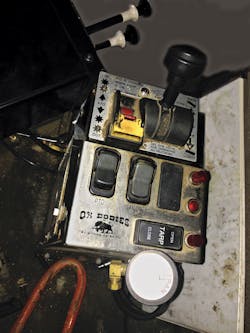Download a PDF of this article.
When those of us involved in the work truck industry think of mobile power controls, pneumatics usually comes to mind. Sure, we also see electric, hydraulic, and combinations of control types, but pneumatics is widely used for it many advantages.
Recently I was working on a salt and sand spreader that has pneumatic controls. I spoke with truck drivers and mechanics to learn what they like about pneumatic controls. They like the feel, reliability, and simplicity. They also like the idea they are much more reliable than electronics in the salty, sandy, and wet and cold environment they run their trucks in. After hearing that, it got me thinking about the features and benefits of these mobile power air controls.
Pneumatic controls come in a variety of sizes, styles, and applications. A short list is valves to control dump trucks, tailgates, winches, and sand spreaders as well as power takeoffs (PTOs). After spending the day with the guys in the shop I wanted to share what I learned from them and what they taught me about their fleet.
Easy to Install
The first and probably most important aspect of pneumatic controls I heard from the driver and mechanic was the fact they are easy to install and use. They are straightforward, and almost foolproof when you install them. This saves them time and money, which we can all relate to. They bolt up easily inside the cab, on the dash, or on a console. The simple and clean push-on hoses are the best idea ever, one guy said. Even if you plumb it wrong, you can quickly swap lines and reinsert and you are up and running. It doesn’t get any simpler to install and maintain, unlike the electrical type that tend to corrode over the season.
Many on-highway vehicles, such as this snow plow/salt spreader, use pneumatic controls for their simplicity, reliability, and convenience simply by tapping into a truck’s existing compressed air system.
Easy to Maintain
The pneumatic controls are simple to maintain, the mechanic said to me. There are very few moving parts, which means less things to go wrong or break. I asked the mechanic, who was working on the sand truck, why he liked the air controls. First thing, he said, is there is a good supply of air already on the truck. It is easy to tap into. It is clean, no mess. The trick, he said, was to make sure you don’t kink the lines or puncture them with a pin hole. One other thing to remember here is that pressurized air can cause personal injury. It is important to follow company, local, and federal safety guidelines and read all the manufacturer warnings before starting any install or repairing any pressurized line.
He also said what he really likes was the fact that they seem to last longer in the salt and sandy environment. Over the years he has found out he changes the electrical parts a whole lot more often than he does the pneumatic parts. Corrosion is the enemy and everything corrodes in salt, he said. The space under the truck is tight and getting smaller. He continued, saying the less time he spends under the truck the better. And that equates to less time getting in there to fix and maintain the truck. He likes it that way. The trick is to make sure the hose lines are secure and not rubbing on parts, structures, or next to hot parts that can melt a hole in the line. Air leaks can be serious business and should be addressed and fixed immediately. The only good thing about an air leak is there is no hydraulic fluid on the floor to clean up. Care has to be taken to ensure other air systems, such as breaks, are not in the same circuit or have the proper safety device in place in case an air leak occurs. A knowledgeable mechanic can install and maintain the system properly to ensure other system are not affected, and that all systems will be as reliable as possible.
Reliable
“If it ain’t broke, don’t fix it,” the driver said to me. Every time I talk to fleet operators or owner-operators of mobile power equipment, reliability always pops up. As one operator put it, you can’t make any money if your equipment is not working right. The drivers in the shop like the feel of the air valve, its action and controls. They know when it is engaged and not engaged. Most have positive detents so you can feel it is in the right place. Some have safety features to ensure you are in the right position. These types of valves have been around in our industry a long time. So one driver can go from one truck to another truck and know how they feel and operate. The feel is intuitive; even new operators can pick it up quickly, one driver said. They know how they work and they are reliable.
In-cab air controls are easy to install and rugged enough to stand up to hostile environments, shock, and vibration in controlling hydraulic and pneumatic valves and actuators.
Readily Available
One other thing truck drivers and mechanics like about the air system is the fact they are easy to get. Parts are all around town, one guy said. They are readily available and in a variety of styles and shapes. Work trucks or vocational trucks need to be versatile and adaptable. Projects and jobs change and the work is not always the same. Whether you are upfitting a new truck or retrofitting an older truck, it is important to have air valves and controls readily available and on the shelf. The mechanic said he likes the fact he can drive over to the supplier and they have what he needs and in the quantity he wants right on the shelf. Most items use standard parts, fittings, and hardware, which is nice. It is nice because he also has those parts in his tool box if he forgets anything. You know, the drawer with a ton of miscellaneous parts every mechanic has (nut, washers, plugs, screws and fittings). So, he get his parts and he is off and running in just a few hours. They are making money and their customer is happy.
A Final Note
Keeping the customer happy by getting the job done right and on time is the key to success. Having reliable, durable air products in the cab that are easy to install and maintain is an important fact to think about when one designs, purchases, and installs a mobile power controls system. Not only are those things important, but knowing what the driver or operator likes and what they are comfortable with can significantly improve productivity and job satisfaction for the owner-operator. All that leads to a satisfied customer and more projects to work on. Like the mechanic said, keep it simple, man! That is what we like. Pneumatic controls are here to stay.
Mikel Janitz is territory manager, OEM applications engineering, at Bezares USA, Tulsa, Okla.
About the Author

Leaders relevant to this article:



